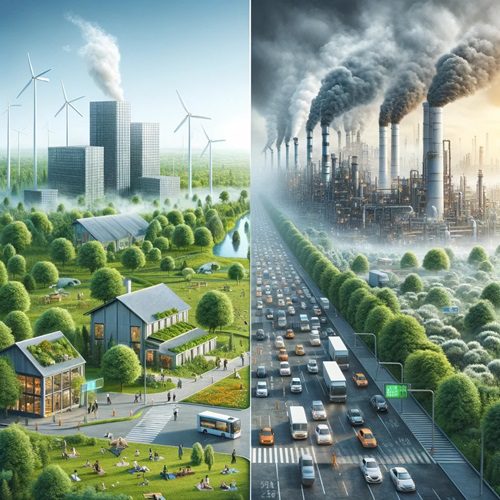 In an alarming disclosure, the latest research by IQAir unveils a dire portrait of the global atmosphere. It starkly indicates that a mere seven out of 134 surveyed nations adhere to the World Health Organization’s (WHO) guidelines for particulate matter (PM2.5)—a pollutant known for its perilous health implications. The 6th Annual World Air Quality Report, leveraging data from over 30,000 monitoring stations worldwide, is a grim reminder of the pervasive challenge of air pollution that transcends borders, affecting billions.
In an alarming disclosure, the latest research by IQAir unveils a dire portrait of the global atmosphere. It starkly indicates that a mere seven out of 134 surveyed nations adhere to the World Health Organization’s (WHO) guidelines for particulate matter (PM2.5)—a pollutant known for its perilous health implications. The 6th Annual World Air Quality Report, leveraging data from over 30,000 monitoring stations worldwide, is a grim reminder of the pervasive challenge of air pollution that transcends borders, affecting billions.
The findings are disconcerting, with Bangladesh, Pakistan, India, Tajikistan, and Burkina Faso emerging as the most polluted countries, with their PM2.5 levels soaring to hazardous peaks. This situation underscores a global health emergency, with the air quality in these nations exceeding WHO’s safe limits by over tenfold. On the brighter side, countries such as Australia, Estonia, and New Zealand emerge as beacons of hope, having achieved the WHO’s stringent air quality standards.
A staggering 92.5% of the countries examined surpassed the WHO’s PM2.5 guideline, signalling an extensive environmental and public health crisis. Particularly alarming is the report’s spotlight on Africa and Southeast Asia. Africa’s air quality data scarcity and Southeast Asia’s escalating PM2.5 concentrations due to climate anomalies and transboundary haze paint a bleak picture of the regional air quality landscapes.
The report’s revelation that the most polluted cities now reside in Central & South Asia, with India hosting the top four, further magnifies the urgency for concerted global action. The United States sees its disparities, with Columbus, Ohio, and Beloit, Wisconsin, marking the extremes of air quality. Meanwhile, Canada’s unexpected position as North America’s most polluted nation calls for introspection and immediate remedial measures.
IQAir’s CEO, Frank Hammes, articulates a vision of clean air as a universal human right, emphasizing the critical role of air quality data in catalyzing action and fostering improvement. The deployment of low-cost air quality monitors worldwide, championed by a network of citizen scientists and advocates, highlights a grassroots movement towards bridging the monitoring gaps and combating air pollution.
The report’s findings not only shed light on the inequities of exposure among vulnerable populations but also echo the call for an intensified global effort to address the root causes of air pollution. Aidan Farrow, a senior scientist with Greenpeace, underscores the need for a collective push to reduce dependence on combustion-based energy sources and enhance air quality monitoring in underserved areas.
In the face of these daunting challenges, the 2023 IQAir World Air Quality Report stands as a clarion call to action, urging local, national, and international stakeholders to unite in combatting the scourge of air pollution. It’s a reminder that while the fight for clean air is far from over, the knowledge and tools to turn the tide are within our grasp. As the report concludes, addressing air pollution is not just an environmental imperative but a moral one, underscoring the need for immediate and decisive action to safeguard public health and ensure a sustainable future for all.
Written by: Charmaine Lu


















Yep, for 25 years they have been telling us the world has been going to end in five years. No wonder most people under the age of 30 have “climate anxiety”. The Ozone Hole was the harbinger of doom, they forced the west to change refrigerant gases, yet a certain country went on to produce double
the amount of the bad gas that the whole world was producing at the time of the change over.
What happened?
The Ozone Hole healed itself.
Constant scare tactics about climate, which conveniently ignore all the predicted calamities that did not happen.
Greta is a millionaire from it, as are many others.